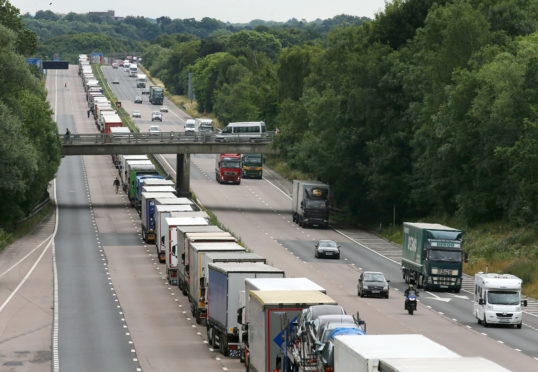More than half of Scotland’s engineering firms are not ready for leaving the EU on January 1 2021, the industry body has warned.
And the head of the Road Haulage Association has branded the UK Government’s efforts ahead of leaving the single market as “bonkers”, claiming lorry firms are being left behind and not listened to.
Paul Sheerin, chief executive of Scottish Engineering and Rod McKenzie, managing director of policy and public affairs at the Road Haulage Association, both provided evidence to the Scottish Parliament’s external affairs committee on Thursday.
There are 57 days left until January 1 2021, with both industry experts warning of a deluge of work required to prevent damage to the economy.
Lorry-load of worries
Mr McKenzie warned the operations of every haulage company in the country could be “crippled” by the inaction of the UK Government and said the industry was demanding more engagement with officials.
He added a lack of permits, which would allow drivers to bring goods in and out of the country, was of great concern.
There are currently only 4,000 permits available, when more than 40,000 are needed, he added.
MSPs questioned the pair on the preparedness of their respective industries for tariff regulations and trade rules post-Brexit.
“It’s been a shambles from beginning to end,” Mr McKenzie said.
“The information we have is incomplete, inadequate and quite often totally incomprehensible.
“We feel we have been badly let down by the UK Government from beginning to end.”
He added the industry was short of around 50,000 workers, UK-wide, and 10,000 in Scotland as a result of the end of free movement of people.
Lorries could be parked in so-called lorry parks in order to cope with the paperwork expected to be created by the UK’s leaving the EU next year.
Moving from status-quo bad for business
During the same meeting, Paul Sheerin of Scottish Engineering noted 52% of firms represented by the body felt they were not fully prepared for life after January 1 next year.
He said business likes “status quo” and the so-called Australian trade deal being touted by the UK Government was “far away” from that position, which would impact the industry.
There are around 10,000 engineering and manufacturing businesses in the sector, Mr Sheering said.
He said: “In terms of the impact, the truthful answer is: there will be substantial impact but I cannot say what that will be.
“One of the problems with the UK global tariff is it having been rushed out with such relatively short time to go before its impact.
“It is extremely complex, thousands of lines of sub-category components and companies have to understand every single one of them to understand what the impact to their business will be.
“Unfortunately the issue may be they feel the impact first and get tied in knots… then they will be fighting a rear-guard action to clear the backlog.”
A spokesman for the UK Government said ministers are seeking a free trade agreement which would allow liberalised haulage arrangements to continue, but plans are being stepped up in case a deal is not reached.
The spokesman said: “We are making significant preparations for the changes at the end of the transition period – including investing £705 million to ensure the right border infrastructure, staffing and technology is in place.
“We are optimistic that an agreement can be reached that will continue to enable the substantial flow of international haulage, which is so important to businesses and consumers on both sides, and have always been clear that we would not intend to rely solely on ECMT permits.”

